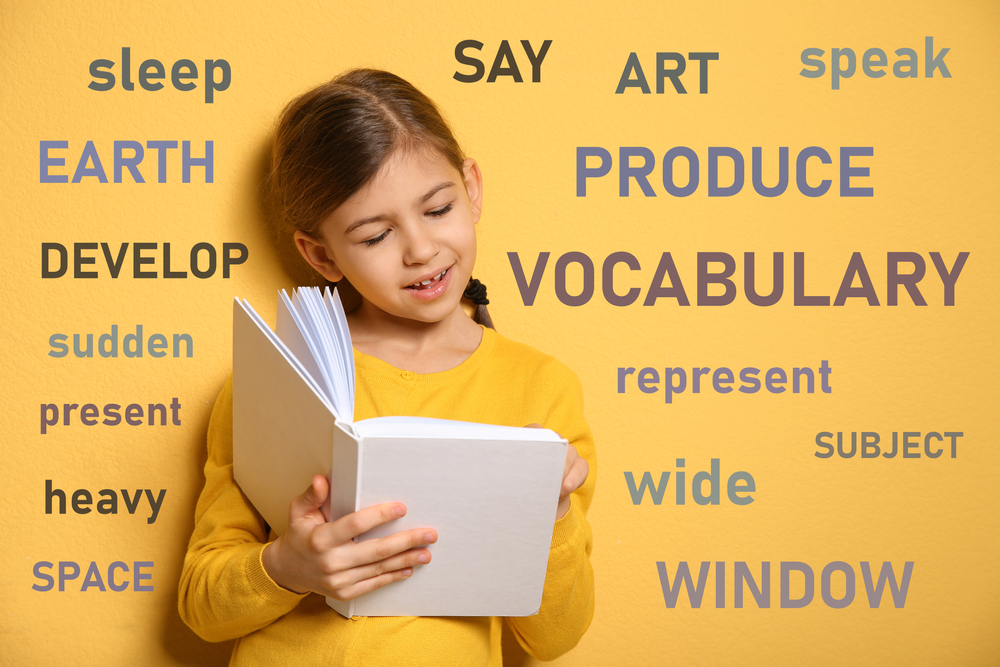
Vocabulary skills help children grow their language knowledge and learn new words that help them to express themselves. Books and stories can introduce children to words they don’t know. If a child reads over the word, they could lose the meaning of the sentence or even the plot. Words help tell the story, and growing their vocabulary helps children on their reading journey.
Parents can help children boost their vocabulary by encouraging children to look up words they don’t know as they read. In addition, these five vocabulary apps for children make it fun to learn new words as children increase their personal word bank:
- Word of the Day
- Dictionary.com
- WordPal
- Vocabulary Flashcards
- Readability
Word of the Day (via the App Store and Google Play)
The App Store classifies this app as suitable for ages four and up. Word of the Day offers flashcards for each user and, of course, provides a “word of the day.” Children will enjoy learning a new word each day and reviewing their flashcards, too. However, as words could be more complicated, parents might have to help children sound them out. The app is free to download, but watch out for in-app purchases (parents can disable this).
Dictionary.com (via Google Play and the App Store)
This app lets children have the dictionary on any device. Look up words from books and stories or just randomly search a word to learn its meaning. The app lets children listen to the pronunciation of words and take quizzes, too. Dictionary.com even offers word games and it’s free to download.
WordPal
While WordPal is available on the App Store, another app called Word Pal is offered via Google Play; while these are different apps, they are both good options for children. WordPal is appropriate for ages 4 and up, but younger children might find the app to be a bit more difficult (because of some of the words). WordPal helps increase vocabulary knowledge through synonym quizzes and showing the definition of each word. Users also can see words used in a sentence. Download WordPal for free to explore it; the app offers in-app purchases.
Vocabulary Flashcards
There might be numerous apps for vocabulary flashcards via both Google Play and the App Store. Check out the different apps formatted in a flashcard design to find the best one for children. These apps are typically free to download, but, again, beware of in-app purchases.
Readability
Readability is a reading program that also helps children grow their vocabulary. Children start the Readability program at a reading level below their current level. Each reading level on the program includes a learning library; children read these books aloud during lessons.
The program includes a virtual reading tutor that guides lessons; this tutor is unique in that it is programmed with voice recognition software. Since children read books aloud for their lesson, the tutor learns the child’s voice and can identify when the child needs help. Like an in-person tutor, the virtual tutor provides feedback, guidance and encouragement.
Each book includes a list of vocabulary words to help facilitate comprehension. Children review these words and learn their definition. In every book, children can tap a word in a story to hear the definition or hear the word used in a sentence.
All vocabulary words a child discovers are included in a master vocabulary list (which also includes all the vocabulary words for the books they have read). Children can open this list at any time to review words.

Expand Vocabulary at Home
When children are reading books at home, parents can help them to expand their vocabulary by keeping one tool handy at all times: a dictionary! Download a dictionary app to a child’s smartphone, tablet or computer to ensure they always have words at their fingertips.
Children should own a physical dictionary, too. While parents can find massive dictionaries, many bookstores offer smaller paperback dictionaries that children can keep near them as they read.
As children read their book, parents should encourage them to develop the habit of looking up any word that they don’t know. Eventually, consulting the dictionary becomes a normal part of the reading process.
Vocabulary Skills Begin and Develop Early
Infants hear their parents speaking, and they learn the words they hear. They process these words and begin to try to imitate the words into speech. In addition, babies and children also learn words from books their parents read to them.
In fact, reading is fundamental to the development of word knowledge. One study revealed that children whose parents read them five books a day started kindergarten knowing more than one million more words than children who didn’t hear books read aloud at all. Reading aloud and reading daily makes a difference; unfortunately, a vast gap separates children who enjoy storytime with parents and children who never share this experience.

Words are Everywhere So Be Prepared
Parents know that children ask questions parents can’t always answer. Children can stump even the brightest parents with their questions, but, when it comes to word knowledge, parents can come prepared.
Pack a small dictionary in the car or in a handbag. If a child sees or hears a word that they don’t know (and that parents might not know), look it up together. Parents and children can learn new words together.
Play Word Games to Build Vocabulary
Word games can help children build their vocabulary and grow their personal word bank. Play synonym games and challenge each other to identify a synonym (or antonym) of a word.
Parents can purchase a thesaurus to help children learn different synonyms and antonyms of common words. It’s fun to use a thesaurus to learn new ways to express the same idea.
Use Words in a Sentence
Learning new words should lead to using those new words. As children grow their vocabulary, encourage them to use their new words. Instead of reviewing the meaning, ask children if they can use a new word in a sentence or put the word in context.
When educators teach vocabulary, children often need to learn the definition and then apply their knowledge of the word by using it appropriately in a sentence. This helps children master the word and its usage.
Pronunciation Matters
Reading proficiently requires proper decoding skills. As children learn new words, parents should make sure they know how to speak and pronounce those words accurately. Help children sound out difficult words.
Parents might be confused about the pronunciation, too. Dictionary apps typically include a feature that lets users hear the pronunciation. Take advantage of this feature!
Vocabulary skills are an important part of the reading journey. There are many free apps that can help children grow their word knowledge and expand their vocabulary. In addition, parents can help children explore words by keeping a dictionary nearby and encouraging children to look up any word they don’t know. Playing word games also can help children expand their word bank. As children learn more words, encourage them to incorporate these words into their daily lives; use these words in writing assignments or try to include them in conversation. Applying word knowledge demonstrates mastery and builds confidence, too.

 Español
Español